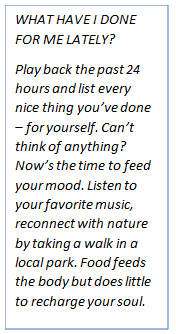Boost Happiness by Spending More Time in Nature
by Liz Stovall, Manager, Fitness & Wellness Division, Department of Human Resources

Think back to a favorite vacation. Did you spend most of the day in the sun, perhaps on a sandy beach? Or was it an escape to the mountains spent skiing or hiking? Regardless of where you went or what activities you chose to participate in, the best vacation memories come from spending time in the great outdoors.
Medical research is shining light on the fact that connecting with nature boosts productivity, creativity, resiliency, mental focus and happiness. As Americans, we have grown accustomed to a mundane schedule of working, watching TV and sleeping. We are attached to technology, leaving us inactive and indoors. The combination of a sedentary lifestyle and not getting outside can lead to poor physical and mental health.
While now is not the time to plan a vacation, it is the time to do our individual part to practice social distancing and perhaps self-quarantine due to our current public health crisis. It is the time to be intentional about scheduling in ‘nature time’ everyday (weather permitting). Eat your lunch outside, go for a walk, move your exercise time to the backyard, or even catchup on email in a nearby green space. Take a breath of outside air!
Believe it or not, breathing in fresh air (oxygen) does affect your sense of well-being and happiness. Oxygen levels in your brain are tied to your levels of serotonin, the neurotransmitter that affects not only mood, but appetite, memory, and social behavior. Too much serotonin and you become irritable and tense. Too little serotonin and you can become depressed. Breathing in fresh air can help regulate levels of serotonin and promote happiness. All it takes is 20 minutes!
 Boost your happiness and join the 21 Days to Connect with Nature Challenge! Visit the Health Trip page on the Power Henrico website for details.
Boost your happiness and join the 21 Days to Connect with Nature Challenge! Visit the Health Trip page on the Power Henrico website for details.


 The trouble happens when we are under chronic stress and secrete too much cortisol for our bodies to break down properly. A common sid
The trouble happens when we are under chronic stress and secrete too much cortisol for our bodies to break down properly. A common sid